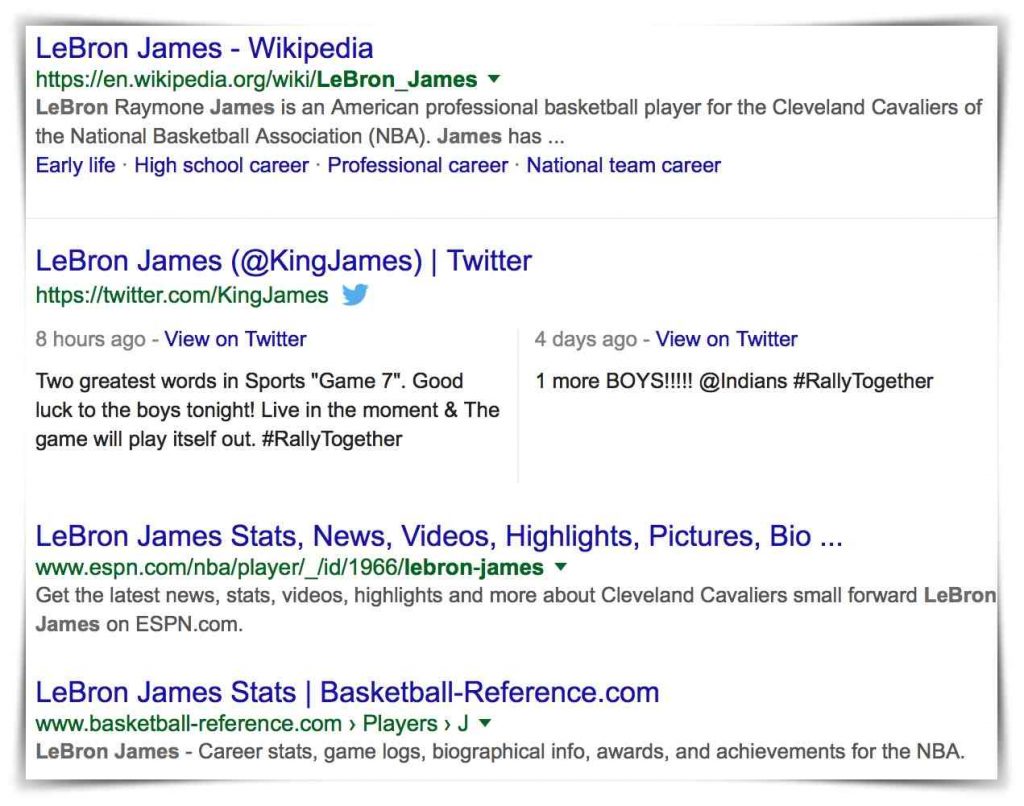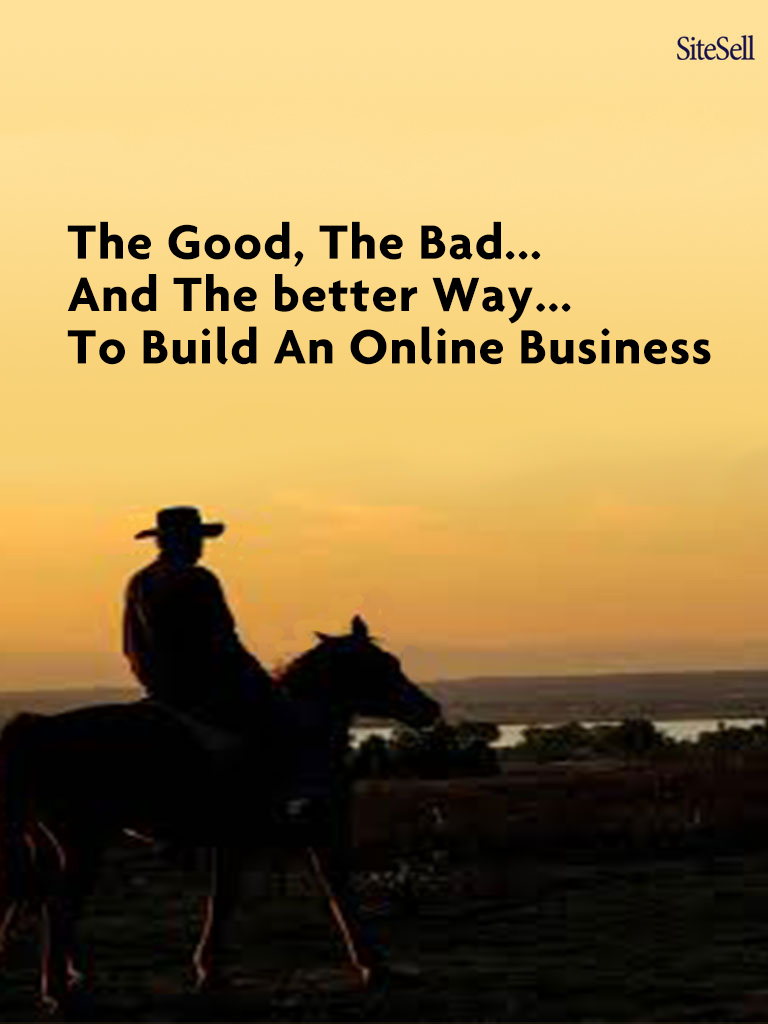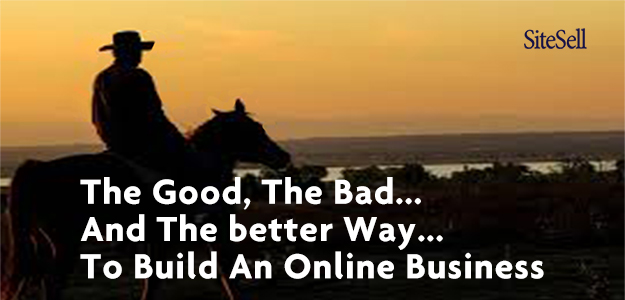We’re not even going to waste your time talking about the bad way…
Are you knowledgeable and passionate about a particular niche? Great news…
There are others who’d like to tap into your brain!
That’s the rationale behind the most cost-effective way to build a real internet business…
- Create content around a topic you know and love.
- Attract the attention (search, social, mobile) of all those folks who want to know what’s in your brain.
- “Wow” them with the quality of your content, building “like and trust.”
- Make money by selling your own products or services, or promoting the products and services of others.
Okay, it’s a tad more involved than that! (The SBI! Action Guide covers the step-by-step details of the C → T → P → M process.) Those bullet points represent one of the most consistently reliable ways for a solopreneur to succeed, more so today than ever.
Sure, there are other ways to build an online business. You could develop a product, for example, and drive traffic to your sales page with Facebook ads. You could build an eBay or Etsy empire . You could become a superstar vlogger.
Those ways work! But they’re risky, much harder to win. Yes, you may hit the jackpot. More likely, you’ll empty your pockets.
Creating content to build an audience is more than low risk with a high chance of success, it can be boiled down to a reproducible process. In other words, we boil it down to a series of steps that, if well executed, deliver success.
The vlogger who goes stratospheric? That’s lightning in a bottle. We can’t teach that. Even the person who did it once has trouble doing it a second time. On the other hand…
The solopreneur who creates content around a topic she knows and loves, builds a relationship with an ever-growing audience, and then monetizes that audience? No magic necessary!
Just one caveat…
Make Your Content “Evergreen”
Most solopreneurs automatically think about classic blogging when considering an online business. And for good reason…
It’s what everyone else does!
We recommend the fundamentally different format of a Theme-Based Content Site (“TBCS”). Two reasons…
- A TBCS is based upon evergreen content. As we’ll see, that translates into a larger, longer-lasting flow of free traffic from search engines and social media. Blogs are not search friendly. Most Google search results come from evergreen content sites.
- “Everyone else” blogs, so there’s more competition. For some reason, blogging is seen as being “cool.” The TBCS’s make the money – that seems “cooler,” right?
What’s So Great About Evergreen Content?
As the name suggests, evergreen content stays relevant long after publication. Blog content, on the other hand, tends to focus on…
- what’s new
- what’s just around the corner
- what’s trending
- what’s fashionable
- what’s seasonal.
A wine blogger, for example, might write an article on whether 2016 was a vintage year for Champagne. An evergreen sitebuilder would write about the difference between vintage and non-vintage Champagne.
The successful blogger gets a lot of visits from followers when s/he first posts. But the traffic fades after that. The evergreen article keeps attracting a steady stream of free search engine traffic indefinitely.
The two formats have very different philosophies…
- The classic blogger strives to be a cutting-edge voice in his/her niche. And that means keeping up with — and ideally staying one step ahead of — whatever is happening now. This builds followers, but you have to be excellent. It’s a tougher road to hoe.
- The evergreen sitebuilder strives to create a long-lasting body of work that will be as relevant in 2020 as it was in 2010. S/he updates pages as necessary, instead of posting updates (the blogger’s approach). One complete page about a topic that is up-to-date is more attractive for search than a series of “what’s new” pages.
The difference can be summarized as “what do folks need to know now?” vs. “what do they need to know?”. The different functions are reflected in the structure of their sites…
- The blogger’s posts are arranged in reverse chronological order. The older they are, the more they get lost in the sands. Posts are organized by category, but even then, what’s old and outdated is pushed to the bottom (as it should be).
- A Theme-Based Content Site is arranged topically, not chronologically (i.e., topic > sub-topic > sub-sub-topic). Unlike those long-buried blog posts, a page on a TBCS is never more than 2 or 3 clicks away (as it should be). The 2nd tier pages are not just a “category,” but an actual page that covers the bigger picture before linking to its sub-topics, often within the body of the page.
Bottom Line (So Far)?
We’re not discouraging the would-be solopreneur from blogging, nor are Theme-Based Content Sites always the best format. Blogging can build a viable internet business if your niche lends itself to that format. However, most niches are better served with a TBCS…
For example, if you live in and love the island of Fiji, tourists aren’t much interested in the latest news. They want unique and valuable content that is relevant to their upcoming vacations. Wood-workers want to see how to build things, learn techniques, etc – your content is likely to be video-oriented. “What’s new” isn’t of particular interest.
Woodworking tools could be covered with either format… news and reviews of the latest vs. a site that organizes them into 10 categories (sanders, drills, etc.) and then perhaps, the top tools of each category. The evergreen content site updates pages about particular models as needed but also has video information about how to use the types of tools.
What does work for blogging? Fast-changing fields like technology, consumer electronics, internet marketing, etc. Content sites don’t make much sense for fields like this. But blogs? Perfect. For example…
No one cares much about the iPhone 4 anymore (so would not make sense as evergreen content), but if you create a fantastic review of the latest iPhone that gets a lot of attention (i.e., they generate those off-page signals for Google), your post just may rank for “regular” search for this type of non-evergreen content.
It used to be search vs RSS followers. However, SBI! was the first to add an automated RSS feed to allow those who enjoy the content to subscribe to new pages. Blogs, meanwhile, still suffer from being less “search-natural.”
If you dream of online business success but aren’t sure about how to get there, our best advice is to build an evergreen Theme-Based Content Site. Your odds are better.
Every piece of content you create will drive traffic to your business indefinitely. And you’ll be free of always having to stay one step ahead of what’s new.
Just one more tip to give you an edge in your future endeavor….
Don’t Take “Evergreen” Literally
Think about a mighty pine tree. When you look up into its boughs, the “green” that you see isn’t precisely the same green that you’ll see next year or the year after that. Some of the needles will have died and dropped to the ground…

Up in the canopy, fresh green needles will have taken their place…

So it is with “evergreen” content…
Yes, a new content page lasts a long time (waaaaaay longer than a newsworthy blog post). But revisiting that content periodically — cutting away what’s stale, adding something fresh — will make it last indefinitely.
The blog post covering a news item? Once the moment has passed and the leaves have dropped, that’s it….
When someone Googles “LeBron James,” blogs and news sites dominate the search results pages for weeks after his team wins a world championship. Usually, however, pages that summarize his career, his statistics and LeBron James himself show up in the rankings.
There may or may not be some news about him above the content results, but for the most part, search is primarily about content pages because they deliver what searchers want…
Evergreen but up-to-date content!

That is what makes the sitebuilder’s job so much easier than the blogger’s….
The classic blogger needs to create a steady stream of content that will burn brightly for a short time, then fade. The sitebuilder creates a piece of content that, aside from an occasional refresh, lasts forever and is favored by search.
Neither is favored by social media marketing, which should support both types of websites. And both work pretty much the same in mobile.
What about the bottom line, monetizing? Well, the more traffic you build, the more you monetize. And most folks build better traffic with content sites.
Wrapping Up
Blogging is a viable way to build a real internet business. But in its classic form, it’s an inherently more difficult approach to excel, compared to a Theme-Based Content Site.
High-quality evergreen content, by its very nature, delivers higher volumes of search traffic for less work, while still building a following through RSS and fitting in with social media. The “advantage” is even more pronounced for as long as most would-be solopreneurs are drawn to the “sexier” world of blogging!
Shameless Self-Promotion: For 15 years, SBI! has enabled solopreneurs to build profitable online businesses by creating content sites that work. Sites built with SBI! punch way above their weight, capturing an unusually high percentage of all such profitable active sites.
Try it today to see for yourself. Or try SBI for WordPress if you prefer. The two are identical except that the former uses SBI!’s world-class “BlockBuilder.”

Latest posts by Margit Streifeneder (see all)
- From Zero to 1 Million Fans: A Community-Driven Success Story - October 16, 2025
- Six Figures on Her Terms: A Lifestyle Business Success Story - September 25, 2025
- From Sheds to Sales: A 20-Year Digital Product Success Story - September 11, 2025



